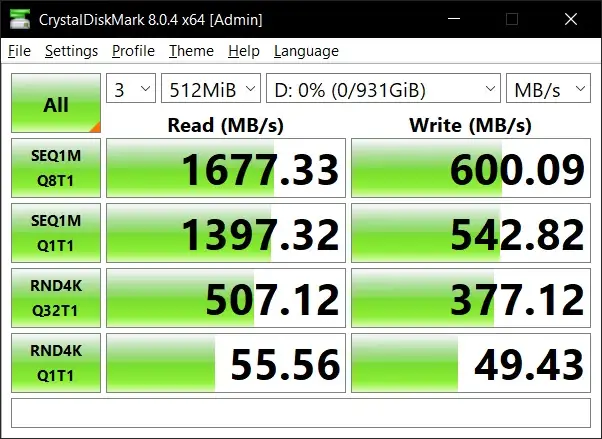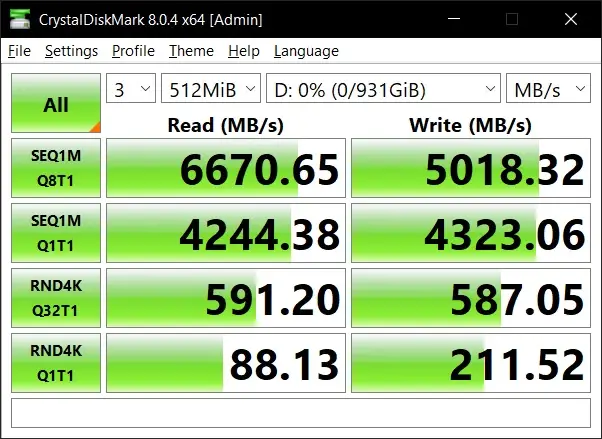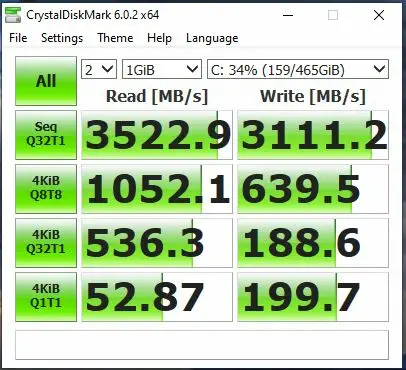-
Posts
38 -
Joined
-
Last visited
Content Type
Forums
Status Updates
Blogs
Events
Gallery
Downloads
Store Home
Posts posted by linustechtipscom
-
-
I was thinking it was defaulting to 1x 4.0 lane didn't thought it could be setting to 2.0. How do I manually set PCIe speeds in bios, anyone here familiar with MSI clickbios 5?
-
7 minutes ago, Chris Pratt said:
Bizarre. I can't think of anything that would explain that. You can get higher speeds on that slot with a Gen3 drive, and you get full speed when connected via an addin card. If there was something wrong with the slot, the Gen3 drive would be expected to have issues too and if there was something wrong with the drives, they'd have poor performance plugged into the addin card as well.
Real head scratcher. How long have you had the board? That still seems like the most likely candidate, so might be worth returning or RMAing it, just to rule it out, if nothing else. FWIW, the MSI X570 Gaming line of boards are known to be subpar, but most of the issues I've heard of centered around overheating and poor VRMs. Still, given there's known issues, it's not out of the realm of possibility that this is just one more.
had the board for quite a while bought it like November 2019. Had no issue with it what so ever. I've OC 3600x, 5800x, 3600mhz micron E, 3600mhz hynix C and 4400mhz Samsung b with really good results (3800mhz 14-8-16-13-27-288 at 1.53v).
Only explanation I have is poor connection between CPU pins responsible for PCIe lanes. OR pins in m.2 slot. Probably not good enough connection for higher frequency PCIe 4.0 link and that's why speeds are all over the place.
-
I have two 980 pro SSDs 500gb and 1tb. Both of them are extremely slow when connected to top M.2 slot (which is connected via CPU 4x PCIe 4.0 lanes).

Both work as expected with very good results when connected to chipset m.2 slot or through cheap amazon PCIe adapter card.

And here's 970 Evo plus connected to top M.2 slot (which is connected via CPU 4x PCIe 4.0 lanes).

Specs:
CPU: Ryzen 5800x
motherboard: MSI x570 gaming plus.
CrystalDiskInfo, hardware info and Samsung magician report the SSDs connected through 4x PCIe 4.0
Iv'e tested 4 SSDs (980 pro 500gb/1TB, 970 evo and P34A80 1 TB) in both m.2 slots and PCIe adaptor card (PCIE to m.2). The PCIe 3.0 SSDs works fine in both m.2 slots and PCIe adaptor card. PCIe 4.0 SSDs work fine in the bottom (chipset) m.2 slot and PCIe adaptor card. but both 980 pros slow down when plugged into top CPU m.2 slot.
Also my bottom 16x PCIe slot is connected to the chipset lanes and top is connected to CPU lanes. when the 980 Pros are plugged into PCIe adaptor card they work fine in either of the PCIE 16x slots.I've updates to SSDs to latest firmware.
bios to latest firmware.
Updated chip set drivers.
forced installed Samsung NVME express drivers.
disconnected all SATA devices
disabled onboard LAN and audio devices.
reseat the CPU twice.
please send help I'm trouble shooting this for three days straight.
-
On 10/17/2021 at 1:56 AM, nelska said:
I have a freesync monitor and a nvidia gpu so i use gsync. but it wont go under 50hz. lol.
Up until january 2019 Nvidia didn't support freesync monitors. G-sync was exclusive to G-sync monitors. What you have is a g-sync compatible monitor and these only clock down to 48hz.
23 hours ago, nelska said:I play the csgo. totally matters. I disable it. Even tho I just upgraded for it. I paid the cost of my card again to see how it works. It's cool. I would use it in campaign mode of any game. but totally unnecessary. its more immersive. but its like sticking your neck out to be shot at.
True, literally makes the difference between getting killed or killing your opponent in almost any FPS game. Input lag is a serious issue which almost every above average players has known about it for years and now Both LTT and Nvidia have confirmed it.
-
You know that g-sync has latency penalty, beats the purpose of high refresh rate panel. Screen tearing isn't that big of a issue at high FPS so might as well just leave it off. What's most important at high fps is consistency, uncapped FPS will be all over the place and inconsistent. It might also cause stutters. You just want to cap your fps to just above your monitors refresh rate. For games that can't achieve high fps you just want to cap the fps to just above average FPS. Let's say a game gets about 125fps, you wanna cap it to about 130fps.
Also G-sync monitor have variable refresh rate. This means if GPU fps drops below the max refresh rate, monitor will dynamically lower the refresh rate all the way down to 1hz. This good for when you max out the settings and game run sub 100 fps. There won't be any tearing even if FPS drops below something like 15 fps.
AMD freesync has the same feature but refresh rate doesn't go below 48 hz. So, on AMD freesync is useless below 48fps.
-
-
it would hardly be a monopoly because TSMC, Samsung and Qualcomm exist..
-
what GPU are you using?
your score might had went down because you might had something running in background. If you are on windows 10 enable focus assist from notification panel at bottom right and then run the benchmark.
I had the exact same problem with my 3600x, lower clocks results were better than higher clock ones. I thinking its a something to do with not enough volts. If i remember correctly CPU was running fine with some extreme low voltages but the results weren't improving. If i remember correctly I was running stable 4.35 GHZ all core with 1.3375 volts but results weren't any better then 4.33 Ghz.
If you're overclocking to improve in game Fps I suggest leave it at stock. I tested with many clock speeds 4.3, 4.33, 4.35, Stock gave the best gaming results. I noticed at stock speed it was boosting to around 4.2 max in games. then I overclocked it to 4.3 it was then boosting to 4.1 max in games. And when I clocked it to 3.8 it was boosting to 3.6 in games. whatever I did it was just boosting about 200mhz lower in games than the actual clock speed.
-
1 minute ago, Deli said:
Ryzen 2 has 15% better IPC than Intel's 14nm+++++. Clock speed isn't the only thing that counts.
so Intel is dead until 10nm comes out in 2020, but intel 10nm for desktop is cancelled so Intel is dead until 7nm comes out in 2022.
-
my point is how much better does it preform stock under best conditions and overclocked? not much as intel's overclocked CPU, because the are basically in a way overclocking at stock settings.
-
all 3 CPUs have 6 core 12 threads.
here are the specs for all three cpus
Ryzen 5 3600 3.6GHz base, 4.2GHz boost.
Ryzen 5 3600x 3.8GHz base, 4.4GHz boost.
Core i7 8086k 4.0GHz base, 5.0GHz boost. speeds bins 3/4/4/5/6/10 (with slowest core boosting to 4.3GHz)
Clearly 8086k should be faster, but it gets destroyed in multi-threading and just about beats 3600 and 3600x at single threaded workloads.
Now of course i7 is manufactured on 14nm++ process and ryzen is made on 7nm process. but intel 14nm++ parts similer to AMD 10 nm parts in density of transistors. so, shouldn't be that much difference in architectural performance .
I'm thinking of buying the upcoming i5 10600k which is rumored to have similar specs as i7 8086k but with slightly lower clock speeds. 6 core 12 threads at 3.7 GHz base, 4.7GHz boost and 4.9GHZ single core boost.
Now on paper it looks like i5 10600k should destroy 3600x even multi-threading with is 12 threads boosting to 4.9 GHz. but if 10600k preforms similar to Core i7 8086k then there is no point of buying this, and just go AMD.
-
6 minutes ago, Vishera said:
AMD CPUs boost as much as possible,with all core boost too,it works similarly to how GPUs boost.
source? if that's the case then stock 3900x is just an overclock 4.6 GHZ 12 core CPU, given that there is enough cooling
-
I was looking on CPU benchmarks on the internet and it looks like stock AMD CPU are preforming much better then they should. Could it be possible that AMD CPU are dynamically boosting all core to max boost speed. Intel's mother boards have a setting called Enhanced Turbo which boosts all cores to max boost clock which you can manually enable or disable.
-
4 minutes ago, Deli said:
3900x chips are binned. I see most of them will boost to about the same clock speed. +- 100MHz.
lets say we have the sufficient cooler. What AMD grantees each core will boost to considering no overclocking is applied. So, what are the official speed bins numbers for Rzyen chips?
-
Intel has exact number for max boost clock for each core. for instant core i7 8700k individual boost clocks:
core 1 4.3 GHz
core 2 4.4 GHz
core 3 4.4 GHz
core 4 4.5 GHz
core 5 4.6 GHz
core 6 4.7 GHz
and base clock is 3.7 Ghz.
why are't there slimier numbers for Ryzen chips
-
I can't find any information on the max boost clock for individual Ryzen cores. lets take 3700x for example. Base clock is 3.6 GHz and max boot for the fastest core is 4.4GHz. Whats the max bost clock for other 7 cores? surly it cant be 4.4 for all core then that would be just 4.4GHz overclock.(kind of)
linustechtips.com admin (not really)
-
my mate recently built a PC and after a couple months it kept turning off (only for first 20 mins and then worked normally). We thought it was either bad PSU or 24pin not making a good connection with the motherboard. or maybe power issue with power switch. We checked all this and none of this fixed the issue.
After reading about it online people suggested that we should update the bios. So after bios completed updating, PC restarted and there was no video. We left if for good 10 minutes and nothing was happening so we force restarted it. and nothing
we almost tried everything we could think of and still no video:
Cleared CMOS
moved the ram to different slot
removed the drives
connected one monitor to motherboard and one to GPU
removed the GPU entirely.
tried bare bones boot
part list
CPU - 8600k
Motherboard - MSI Z370 gaming PLUS
PSU - EVGA super nova G2 650 watt
GPU- Gigabyte RX 580 Gaming 8G
what do I do?/ any help is appreciated. -
On 4/9/2018 at 11:59 PM, KarathKasun said:
E3-1280 is 3.5ghz and Sandy Bridge.
Same for 2700k.
we're talking about i5s. you're mentning i7 and Xeon
On 4/9/2018 at 11:59 PM, KarathKasun said:If its a 2700k, congratulations! Your CPU will likely OC to ~4.7ghz with a good Z77 motherboard. You can get Z77 boards with heatsinked VRM's for ~$100 that should be able to push the CPU to at least 4.5ghz where it will perform very well in even the most demanding games. It should be able to feed up to something like GTX 1080 level GPU performance.
His mobo confirms he has 2nd gen i5 but if he's Right about clock speed, it could be one of those low power CPUs like Core i5-2400S or Core i5-2405S
-
On 4/9/2018 at 11:59 PM, KarathKasun said:
-
7 minutes ago, Saxioliken said:
This is my MB: https://www.gigabyte.com/Motherboard/GA-P61A-D3-rev-20#ov
I can't see anything about ATX, could you tell me if it is OK?
it's an atx board. you have 6 Sata ports to plug in the 2.5 SSD drive but 4 of those are slower 3Gb/s. make sure you plug the SSD in faster 6Gb/s port for best performance.
-
Just now, Princess Cadence said:
All he has to do is open dxdiag.exe like the fastest easiest way to find it out.
or follow these steps
- On the keyboard, hold down the WINDOWS key and then hit R.
- In the Run window, type MSINFO32 and then click OK.
- In the System Information window, click the File menu and then Save.
- Set the desired folder to save to, enter a file name, and then click Save.
and share the NFO file -
4 minutes ago, Saxioliken said:
I remember that my processor had 4 numbers after it
if it had 4 numbers then your CPU is good for gaming.
-
1 minute ago, geo3 said:
That's a huge exaggeration. It's faster but not anywhere close to twice as fast.
i5 7300HQ might only boost to 3.5 but it has 7th gen core and newer core are faster.
-
2 cores. 2 logical processors in a physical processor. your laptop has 4 cores.









Samsung 980 pro SSD extremely slow when connected to CPU PCIe 4.0 4x NVME M.2 slot.
in Storage Devices
Posted
there's no option to set m.2 slot to gen 3. CrystalDiskInfo, hardware info are still reporting PCIe 4.0